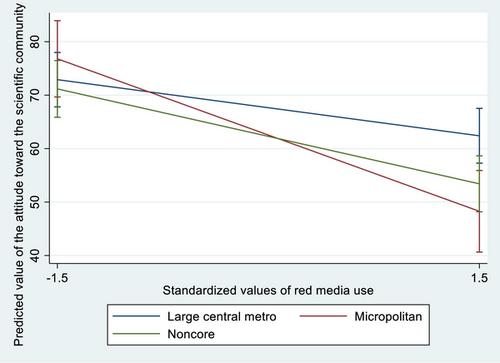Politicized science and rural–urban divides: Exploring how rurality in the place of residence and red and blue media use affected attitudes toward scientists before and during the COVID-19 pandemic
IF 1.8
4区 社会学
Q3 PSYCHOLOGY, SOCIAL
引用次数: 0
Abstract
Based on the concept of place‐based identity, this study disentangles the effects of rurality and partisanship and considers their interactions with red/blue media use in rural–urban divides in attitudes toward scientists. By employing the 2016 American National Election Survey and our 2021 survey data, we investigated how partisanship, rurality, and red/blue media use related to attitudes toward scientists. Analyses revealed distinct roles for partisanship and rurality in predicting attitudes, even after controlling for demographic variables, including family income and education. Compared to those who resided in large metro areas, residents of more rural areas tended to harbor more negative attitudes toward scientists. This tendency was reinforced by red media use in 2021 but not in 2016. Given the dissimilar results in 2016 and 2021 in terms of the interaction of red media use and rurality, we should pay more attention to rural–urban divides in attitudes toward scientists.

政治化的科学和城乡鸿沟:探索居住地的乡村性和红色和蓝色媒体的使用如何影响在2019冠状病毒病大流行之前和期间对科学家的态度
基于地域认同的概念,本研究理清了乡村性和党派关系的影响,并考虑了它们与红/蓝媒体使用在城乡对科学家态度分歧中的相互作用。通过使用2016年美国全国选举调查和我们的2021年调查数据,我们调查了党派关系、乡村性和红/蓝媒体使用与对科学家的态度之间的关系。分析显示,即使在控制了包括家庭收入和教育在内的人口统计变量之后,党派和乡村性在预测态度方面也起着明显的作用。与那些居住在大城市的人相比,更多农村地区的居民往往对科学家持更消极的态度。2021年,红色媒体的使用强化了这一趋势,但2016年没有。考虑到2016年和2021年红色媒体使用与乡村性互动的不同结果,我们应该更多地关注城乡对科学家态度的差异。
本文章由计算机程序翻译,如有差异,请以英文原文为准。
求助全文
约1分钟内获得全文
求助全文
来源期刊
CiteScore
2.80
自引率
6.70%
发文量
42
期刊介绍:
Recent articles in ASAP have examined social psychological methods in the study of economic and social justice including ageism, heterosexism, racism, sexism, status quo bias and other forms of discrimination, social problems such as climate change, extremism, homelessness, inter-group conflict, natural disasters, poverty, and terrorism, and social ideals such as democracy, empowerment, equality, health, and trust.

 求助内容:
求助内容: 应助结果提醒方式:
应助结果提醒方式:


